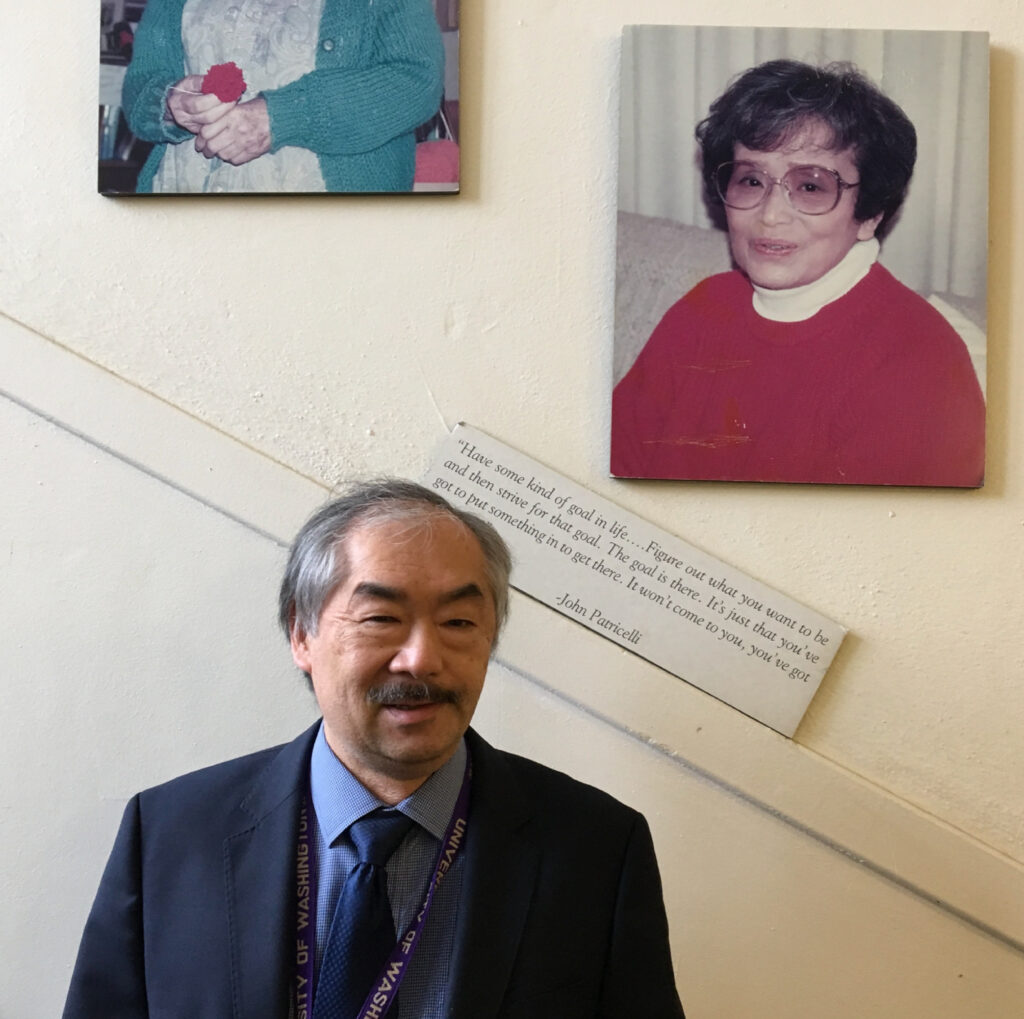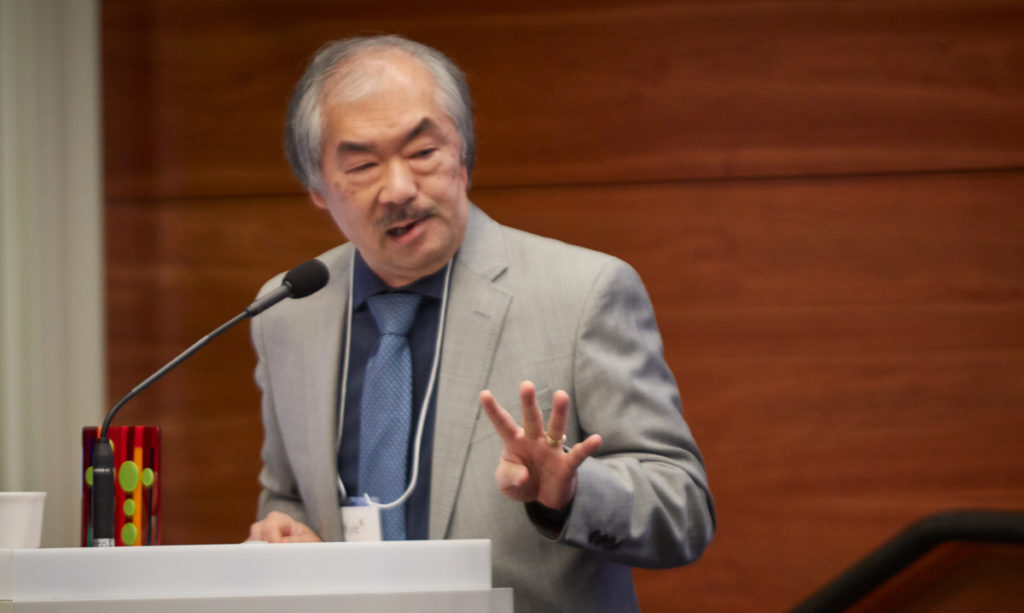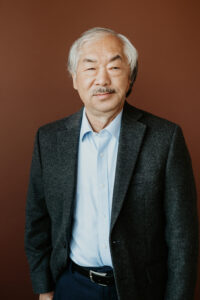April 14, 2025
Dr. Kyle Kinoshita is the current co-president of the Seattle Japanese American Citizens League and a lifelong K-12 and University of Washington educator, serving as a teacher and school principal in Washington’s Seattle, Shoreline, Edmonds, and Highline districts before retiring from Seattle Public Schools, where he was Executive Director and Chief of Curriculum, Assessment and Instruction. The 2023 recipient of the UCEA Excellence in Educational Leadership Award, he has been an affiliate faculty member in the University of Washington-Bothell Leadership for Educator Development (LEDE) principal preparation program since 2011, and is also a faculty member and field internship advisor in the UW Leadership for Learning (L4L) doctoral program.
In an exchange with Densho Education and Public Programs Manager Courtney Wai, Dr. Kinoshita shares a few lessons he’s learned along the way about the importance of knowing your history.
Courtney Wai: Tell me about your background. What connected you to social justice?
Kyle Kinoshita: I have to credit the influence of my mom, Cherry Kinoshita, who has an oral history in the Densho archives. She is also one of the “5 Bad Ass Japanese American Women Activists You Probably Didn’t Learn About in History Class” celebrated in a Densho blog for her tireless fight for redress for the WWII incarceration. Although I didn’t work on redress with her, from a very early age, she communicated what was fair and right. She was unlike many Nisei who wouldn’t talk about the incarceration experience. She told me all about “camp” when I was a young boy. As a kid, I watched her contribute to the anti-nuclear arms movement in the early ‘60’s. Also at that time, she told me that American involvement in Vietnam was wrong. And I remember her getting angry and emotional at the dinner table when she talked about Asian activists at Seattle Community College in 1970 getting arrested for protesting the lack of representation in the faculty.
So, while I didn’t become active in JACL [Japanese American Citizens League] like my mom, it spurred me to get into ethnic studies early on in the ‘70’s. It was only then that I discovered how damaging to the psyche it was by being invisible in the school curriculum. It also spurred me to participate in various causes, like activism against the destruction of the Chinatown-International District with the construction of sports stadiums in the neighborhood.

CW: How did you get into education?
KK: To be honest, it wasn’t my first choice. I wanted to do some kind of human-centered work, and I just happen to have more education credits on my transcript. So I ended up doing my student teaching by coincidence at my old high school, Rainier Beach, and found I enjoyed it. I discovered I could engage well with students of color in the classroom. I was able to use what I learned in ethnic studies, too. But it was tough to get a high school job, so I got my elementary certification, and then found I really enjoyed the shifts in teaching and learning that were happening at that level.
I suppose it was my mom’s influence that steered me toward educational leadership. I wanted to make a bigger difference in making education serve marginalized kids. I ended up being a principal for 13 years, then a district-level leader for another 12. Even though I didn’t get to use my ethnic studies education very much, I was always trying to figure out how to attack the inequity in outcomes with kids the system wasn’t serving. But toward the end of my career, I was able to support the recent revival of ethnic studies.
And though I’ve retired and am trying to wind down, I’m still working to educate those entering school and district leadership at the University of Washington with the same orientation toward justice.
CW: What’s been your connection with Densho?
KK: That has mostly come about with another part of my life after retiring in 2019. I felt it was time to give back to my community, so I began getting active with Seattle JACL. And though I didn’t work with my mom on redress, I felt it was important to help her and others’ legacies continue. So I worked on a major project sparked by Bill Tashima, a longtime JACL leader, that made a huge contribution to preserving Seattle JACL’s history that goes back to 1921 when it was founded. In partnership with Densho, we now have 21 oral history recordings of Seattle JACL leaders of the past five decades hosted on their site, and a complete repository of every Seattle JACL newsletter dating back to the ‘40’s. The repository is searchable by subject but also by name—so if you’re researching your family history and want to know what your grandparents were doing with JACL 60 years ago, you can find it. Dozens of JACL members worked on it, but it was Densho that had the people and technology that created this great historical record. I’ve always felt indebted to Densho anyway, as we have a record of my mom’s personal history and an account of her activism that lives beyond her passing in 2008.
CW: What do you think about the current period we live in?
KK: A lot of people have already commented on it. I’ll just say that we’re faced with serious attempts at erasure of not just our own Japanese American heritage, but of many communities. And it isn’t a mystery as to why it’s happening. If you understand all of our collective histories, you’re going to recognize the inherent injustices and inequities in today’s society. If, for example, you see how the Alien Enemies Act was used in 1942 against Japanese Americans, you’ll understand its use today. And it seems like these are pretty dangerous ideas.
People often ask, “what to do?” Educators face tough situations. Self-care and balance are important for the soul. But one thing for sure—never stop educating yourselves about our histories. By doing this, you’ll gain perspective and resolve from how others dealt with adversity. Nobody knows what will happen, but nobody can take your learning away from you. And you’ll be ready—no one expected the events of the racial reckoning of 2020, and being aware is the best preparation for something like that.
CW: How do you sustain yourself in this work?
KK: It’s not easy or simple, and there’s some cause for discouragement. But I have a poster print gifted to me by a local community artist in the JA community, Erin Shigaki, that simply says, “What kind of ancestors do we want to be?” Yes, it’s a challenging time. But I think of my ancestors, who in 1942 faced losing everything and not knowing what the future was going to bring. In my mom’s Densho interview she talks about being behind barbed wire in the Minidoka concentration camp, sitting at a typewriter trying to write an article for the camp newspaper and being overwhelmed at the injustice of it all. But our ancestors learned resilience.
Many years later, after my mom passed on, what people would say about her is that she was deeply driven by this relentless desire to make things right. She could have had a quiet middle-class existence, but she put herself out there, working on redress at the city, state and Federal level until there was some measure of justice, because she said this country has ideals they should live by. So that gives me some context and perspective.
CW: What gives you hope? How can we think our way through the current time?
KK: Well, this is a question for our current generation of educators and activists, as I’m trying (with little success) to be genuinely retired. But I have some thoughts.
First of all, trying to erase our histories is going to be a pretty tall order. It’s not like when I was younger when there wasn’t much developed about the heritage of peoples who’ve been targets of racism and exclusion. There wasn’t a lot written then, and there was nothing like Densho. But now there is an immense amount of material that has the histories and real stories of people facing injustice. I hope that educators can work these into classroom instruction in a way that circumvents the legal restrictions.
And second, there’s no question that it’s going to be difficult when we’re facing increasing repression toward teaching the truth. Here again, historical perspective can help us think through getting past discouragement and to prevail.
In my leadership courses, I’ve assigned readings from the book Fugitive Pedagogy, by Jarvis Givens. It’s a history book that’s part of the Black intellectual tradition that we should learn from. The book notes that under slavery, to be Black and learn how to read could get you killed. But even after the Civil War and early 20th century South, Black educators found themselves in a vulnerable situation if they chose to teach children authentic Black histories and to aspire beyond their defined place in society. It could mean your livelihood or worse, in cases where the Ku Klux Klan was literally at the doorstep.
The idea of “fugitive pedagogy” came from the historical context of Black education, where enslaved people often learned to read despite the danger, and the fugitive slave was a folk hero. It describes the covert ways Black educators and students in the post-Civil War Jim Crow south conducted education in the face of systemic oppression, often in defiance of laws and governmental restrictions. It was the story of how Black educators working in quiet solidarity developed creative and surreptitious responses to White opposition, teaching ideas counter to racial subjugation through subversive practices. These educators contributed to today’s vibrant tradition of Black Studies.
It goes without saying that learning from “fugitive pedagogy” is relevant today in light of attempts at suppression of history and the brainwashing that racism and injustice has ended.
CW: You mentioned solidarity. What can that look like today?
KK: It means finding ways to collaborate and to support each other. It means standing up to support the history of not just Japanese Americans or Asian Pacific Islander communities but of all those who are facing forced erasure. It means, for example, supporting the preservation of Black studies as well as Latino/a studies. It means upholding the teaching of Native sovereignty, which by the way, is mandated by law in Washington State. Japanese American and Asian Pacific Islander studies are meaningless unless they are seen in the larger centuries-old backdrop of the racial hierarchy in this country, which is the focus of ethnic studies. I don’t pretend to know what the future holds for all of this. But in this current environment, it’s clear about what we need to stand for.
[Header: Dr. Kinoshita speaks after receiving the Valerie Logan Leadership in Science Education Award in November 2018. Courtesy of James Cheng.]

